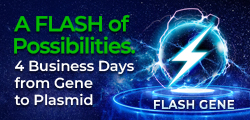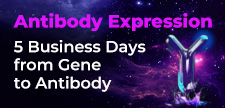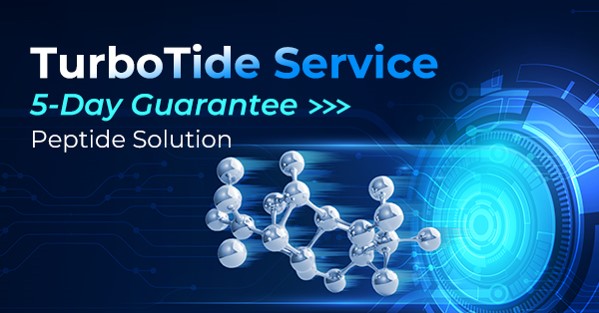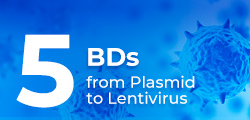-
REAGENT SERVICES
Hot!
-
Most Popular Services
-
Molecular Biology
-
Recombinant Antibody/Protein
-
Reagent Antibody
-
CRISPR Gene Editing
-
DNA Mutant Library
-
IVT RNA and LNP Formulations
-
Oligo Synthesis
-
Peptides
-
Cell Engineering
-
- Gene Synthesis FLASH Gene
- GenBrick™ Up to 200kb
- Gene Fragments Up to 3kb now
- Plasmid DNA Preparation Upgraded
- Cloning and Subcloning
- ORF cDNA Clones
- mRNA Plasmid Solutions New!
- Cell free mRNA Template New!
- AAV Plasmid Solutions New!
- Mutagenesis
- GenCircle™ Double-Stranded DNA New!
- GenSmart™ Online Tools
-
-
PRODUCTS
-
Most Popular Reagents
-
 Instruments
Instruments
-
Antibodies
-
ELISA Kits
-
Protein Electrophoresis and Blotting
-
Protein and Antibody Purification
-
Recombinant Proteins
-
Molecular Biology
-
Stable Cell Lines
-
Cell Isolation and Activation
-
 IVD Raw Materials
IVD Raw Materials
-
 Therapy Applications
Therapy Applications
-
Resources
-
- All Instruments
- Automated Protein and Antibody Purification SystemNew!
- Automated Plasmid MaxiprepHot!
- Automated Plasmid/Protein/Antibody Mini-scale Purification
- eBlot™ Protein Transfer System
- eStain™ Protein Staining System
- eZwest™ Lite Automated Western Blotting Device
- CytoSinct™ 1000 Cell Isolation Instrument
-
- Pharmacokinetics and Immunogenicity ELISA Kits
- Viral Titration QC ELISA Kits
- -- Lentivirus Titer p24 ELISA KitHot!
- -- MuLV Titer p30 ELISA KitNew!
- -- AAV2 and AAVX Titer Capsid ELISA Kits
- Residual Detection ELISA Kits
- -- T7 RNA Polymerase ELISA KitNew!
- -- BSA ELISA Kit, 2G
- -- Cas9 ELISA KitHot!
- -- Protein A ELISA KitHot!
- -- His tagged protein detection & purification
- dsRNA ELISA Kit
- Endonuclease ELISA Kit
- COVID-19 Detection cPass™ Technology Kits
-
- Automated Maxi-Plasmid PurificationHot!
- Automated Mini-Plasmid PurificationNew!
- PCR Reagents
- S.marcescens Nuclease Benz-Neburase™
- DNA Assembly GenBuilder™
- Cas9 / Cas12a / Cas13a Nucleases
- Base and Prime Editing Nucleases
- GMP Cas9 Nucleases
- CRISPR sgRNA Synthesis
- HDR Knock-in Template
- CRISPR Gene Editing Kits and Antibodies
-
![AmMag™ Quatro Automated Plasmid Purification]() AmMag™ Quatro automated plasmid purification
AmMag™ Quatro automated plasmid purification
-
![Anti-Camelid VHH]() MonoRab™ Anti-VHH Antibodies
MonoRab™ Anti-VHH Antibodies
-
![ELISA Kits]() ELISA Kits
ELISA Kits
-
![Precast Gels]() SurePAGE™ Precast Gels
SurePAGE™ Precast Gels
-
![Quatro ProAb Automated Protein and Antibody Purification System]() AmMag™ Quatro ProAb Automated Protein and Antibody Purification System
AmMag™ Quatro ProAb Automated Protein and Antibody Purification System
-
![Target Proteins]() Target Proteins
Target Proteins
-
![AmMag™ Quatro Automated Plasmid Purification]() AmMag™ Quatro automated plasmid purification
AmMag™ Quatro automated plasmid purification
-
![Stable Cell Lines]() Stable Cell Lines
Stable Cell Lines
-
![Cell Isolation and Activation]() Cell Isolation and Activation
Cell Isolation and Activation
-
 IVD Raw Materials
IVD Raw Materials
-
![Quick
Order]() Quick Order
Quick Order
-
![Quick
Order]() Quick Order
Quick Order
- APPLICATIONS
- RESOURCES
- ABOUT US
- SIGN IN My Account SIGN OUT
- REGISTER

![Polyclonal Antibodies Polyclonal Antibodies]()
How to Make Polyclonal Antibodies
Resources » Technical Resource Centers » Antibody Technical Resources » How to make polyclonal antibodies
- Antigen Prediction Tool
- Antibody Selection Guide
- Polyclonal or Monoclonal Antibodies
- Protein Antigens vs Peptide Antigens
- Advantages of Peptide Antigens
- Technology and Protocols
- Disclaimer and Production Note
- Publications
- Antibodies for Senescence and Aging
- Comprehensive Package
- Protein phosphorylation vs. ubiquitination in drug development
- Membrane Proteins
- IgM Antibody
- Self-Tolerance
- Therapeutic Antibody Drug Discovery Planning
- ELISA
- Western Blot Antibody Troubleshooting
- What are monoclonal antibodies
- How to make polyclonal antibodies
- Immune Checkpoint Inhibitors
- Antibody Validation
- Antibody Blog
- Antibody News
- GenSmart™ Variable Domain Sequence Analysis tool for recombinant antibody design
Overview
What is a polyclonal antibody
A polyclonal antibody is a collection of many Immunoglobulins, each generated from a different B-cell clone. These antibodies target different epitopes, or binding sites, on a single antigen. Derivation from multiple B-cell clones and subsequent targeting of multiple epitopes is what differentiates polyclonal antibodies from Monoclonal Antibodies.
How to Make Polyclonal Antibodies
All antibody generation, polyclonal or monoclonal, begins with eliciting an immune response, termed immunization. The intended targets are injected into the host, recognized by the immune system as foreign, and targeted by antibodies for immune blockage or clearance. Failure to mount an immune response would require the use of adjuvants, immunogenic substances such as Freund's adjuvant or keyhole limpet hemocyanin (KLH), to further drive immune recruitment. Immunization comprises the majority of what is required to make polyclonal antibodies. A typical immune response is outlined below.
Making Antibodies Begins With Immunization
Initial Exposure for Prime Immune Response
Initial host exposure to antigen with, appropriate adjuvants, exposure is termed "Prime" immunization. Typical methods of exposure include injection into the skin, peritoneum, subcutaneous layer, or muscle. Less common alternatives are oral and intranasal administration. DNA Immunization is also an emerging technology for toxic or otherwise difficult to produce antigens. Any subsequent exposure to antigen is termed a "boost" immunization.
Antigen Processing by Antigen Presenting Cells
Macrophages, Dendritic Cells (DC), and to a lesser extent B-Cells, all antigen presenting cells (APCs), internalize antigen by endocytosis or phagocytosis. Antigen processing breaks the antigen into smaller pieces which are then moved to the surface of the APC.
Stimulation of B-Cells
Recognition of antigen presented on the surface of APCs induces the release of stimulatory signaling molecules, cytokines, from Helper T-Cells. These cytokines activate B-Cells which also recognized antigen through their B-Cell receptor (BCR). Some B-cells do not require Helper T-Cell activation after BCR-antigen interaction, usually producing a quicker immune response with lower affinity antibodies. The involvement of Helper T-Cells is critical in a replete immune response as well as regulating Self-Tolerance.
Proliferation of B-Cells and Antibody Secretion
Activated B-Cells divide to create both memory B-cell and plasma cell populations. Both types of cells recognize the same epitope. Plasma cells secrete antibodies into the serum for immune recognition while memory B-Cells persist for longer periods, providing quick response to secondary exposure of the same antigen.

Measuring the Immune Response
Measuring the antibody levels during the immunization process is required to evaluate progress. An ELISA against target antigen compares immunized serum samples to pre-immunized serum samples revealing the degree of immune response driven by immunization. Serial dilutions of samples determine the titer of the antibody. Typically a 1:64,000 titer is considered a robust immune response and sufficient for proceeding to serum harvest or lymphocyte fusion. Lower titers may require subsequent boost immunizations, alternative routes of administration, or additional adjuvants.
Polyclonal Antibody Serum Harvest
Polyclonal antibody production merely requires the recovery of blood from the host animal and separation of the cellular fraction from the serum fraction containing secreted antibodies. As many antigen specific antibodies are secreted by multiple activated B-Cells, blood serum contains the many products of different antibody clones, hence the term polyclonal antibody. Specifically, the creation of multiple clonal antibodies against one antigen is achieved by both the processing of antigen into fragments as well as each fragment having smaller regions, termed epitopes. Each can each be recognized by specific BCRs. Distinct B-Cell populations secrete specific, yet different antibodies against the same antigen. Furthermore, serum contains not only antibodies directed against the intended target antigen, but all other immunoglobulins against other targets, drugs, hormones, etc. that are in the serum. Serum can be used directly as a molecular biology probe, but often requires further purification to increase sensitivity and specificity of a particular assay. Affinity purification achieves antibody recovery to varying degrees depending on the technique as shown below, however none reach the epitope level specificity of a monoclonal antibody.
Affinity Purification Technique Pro Con Protein A/G Simple, Cost effective Recovers all immunoglobulin. Antigen Specific Recovers only antigen specific antibody. Requires a non-trivial amount of antigen. Polyclonal Antibody Applications
Application Polyclonal AntibodyUse Rationale Binds multiple epitopes to deliver many detection molecules.ELISA Capture AntibodyPolyreactivity can maximally recover antigen from samples.Western Blot
Detection AntibodyMultiple epitope recognition can allow for antigen changes (denaturing/linearizing).Target recognized by many Ab for maximal drug delivery, immune recruitment, blocking, or activation.Clinical TestsPotentially increased capacity of detection.Polyclonal Antibody Related Services
Our PolyExpress™ service is a cost efficient and fast way of making custom molecular probes. From antigen sequence to delivered antibodies in 45 days guaranteed. Looking for even more control of antibody development? Take look at some of our other antibody services:
DNA Immunizations
our specialty. For the start of any antibody development project. Circumvents in vitro protein antigen production and deals with difficult targets.
MonoExpress™ Antibody Service
service carries industry leading application guarantees, ensuring success in your assays.
Anti-idiotype Antibodies
make PK or PD testing of therapeutic antibody drugs easy. They only detect the CDR of the target antibody.
With 12 years of experience developing customized antibodies, your project is in expert hands. Get a quote today!
Quotations and Ordering
Click the quote button,provide service information and submitOur Technical Account Manager will contact you within 24 hours to finalize quoteYou review and approve final order details and priceYou provide credit card/PO information and order is placedProject is initiated immediatelyOur Project Manager will be in contact with you to provide updatesOur customer service repsentatives are available 24 hours a day, Monday through Friday, to assist you.

-





































